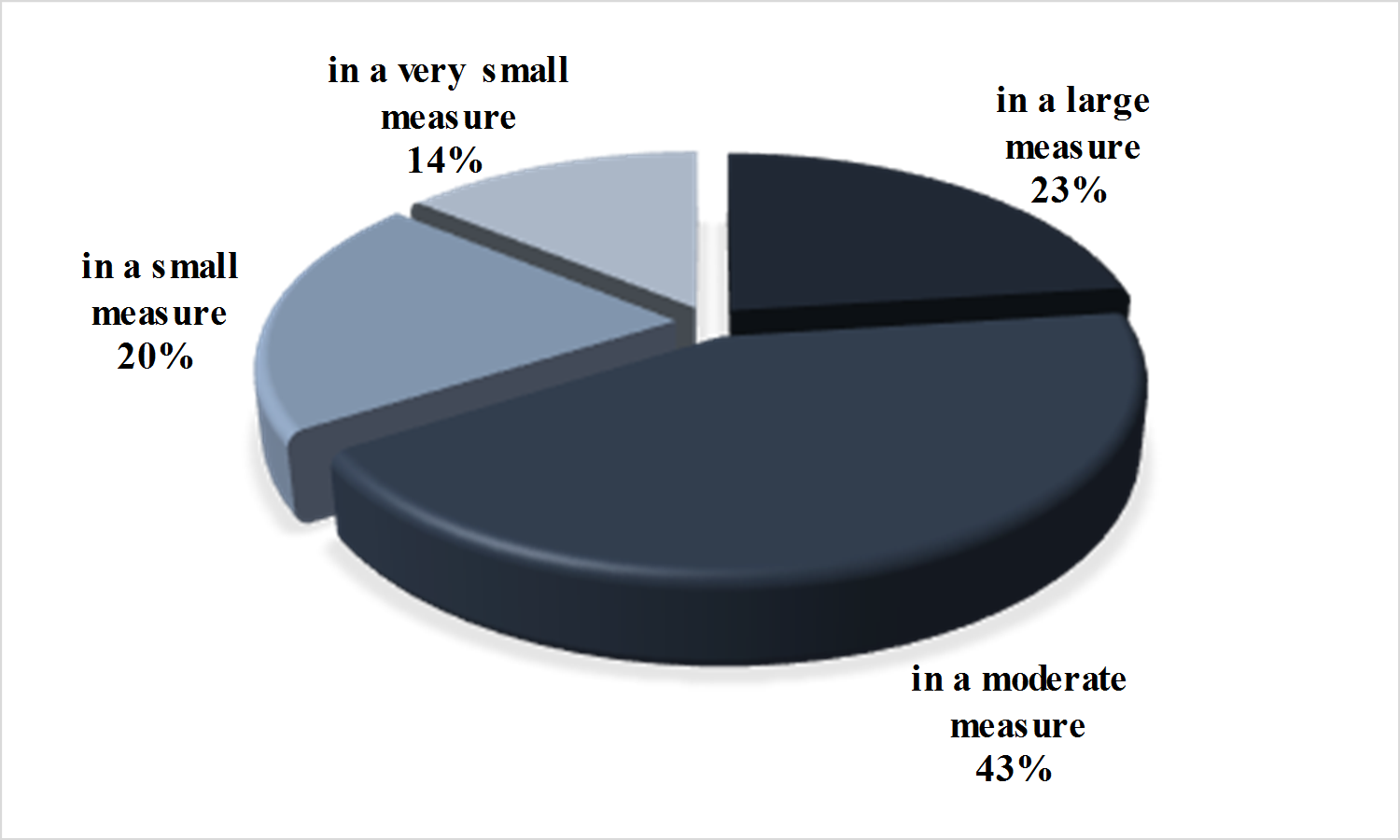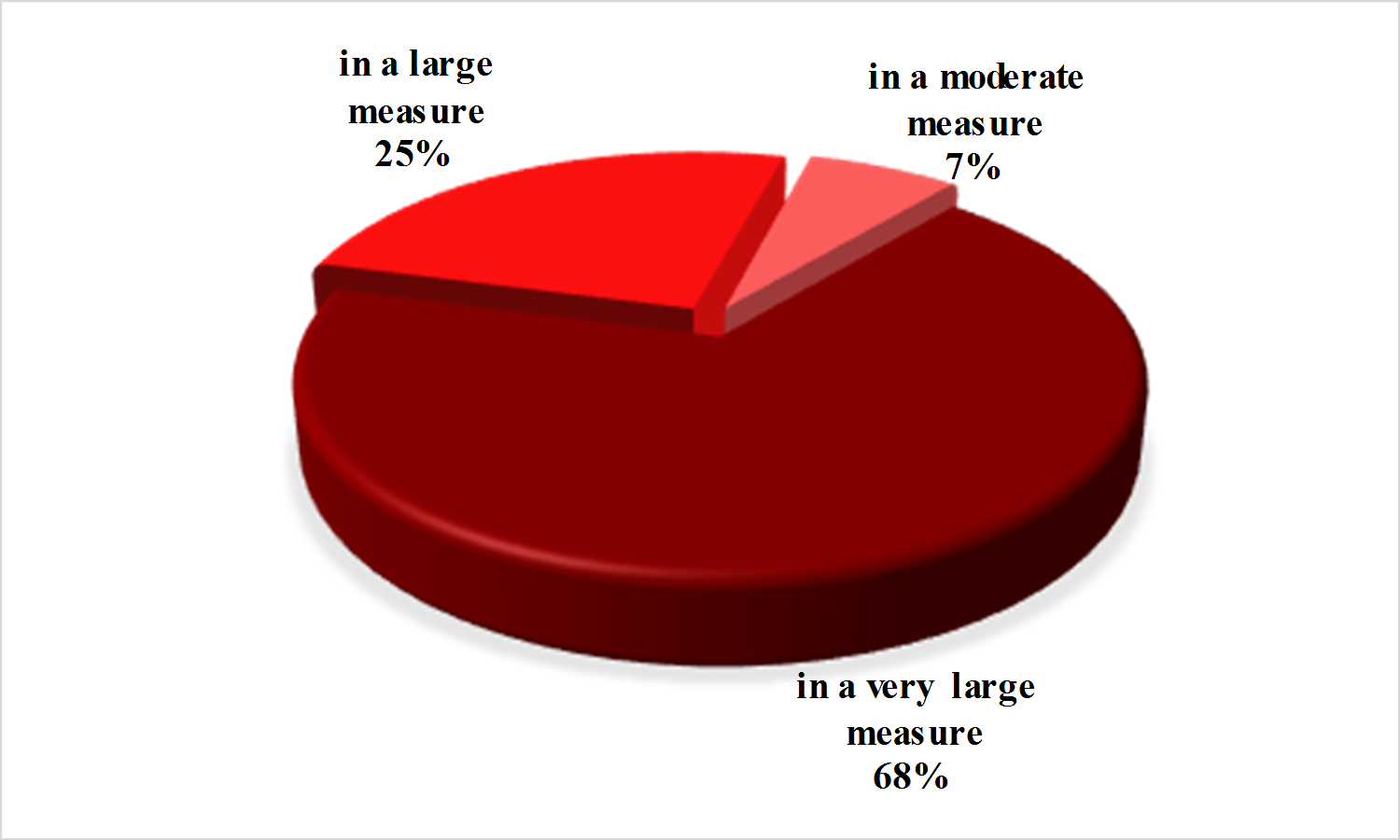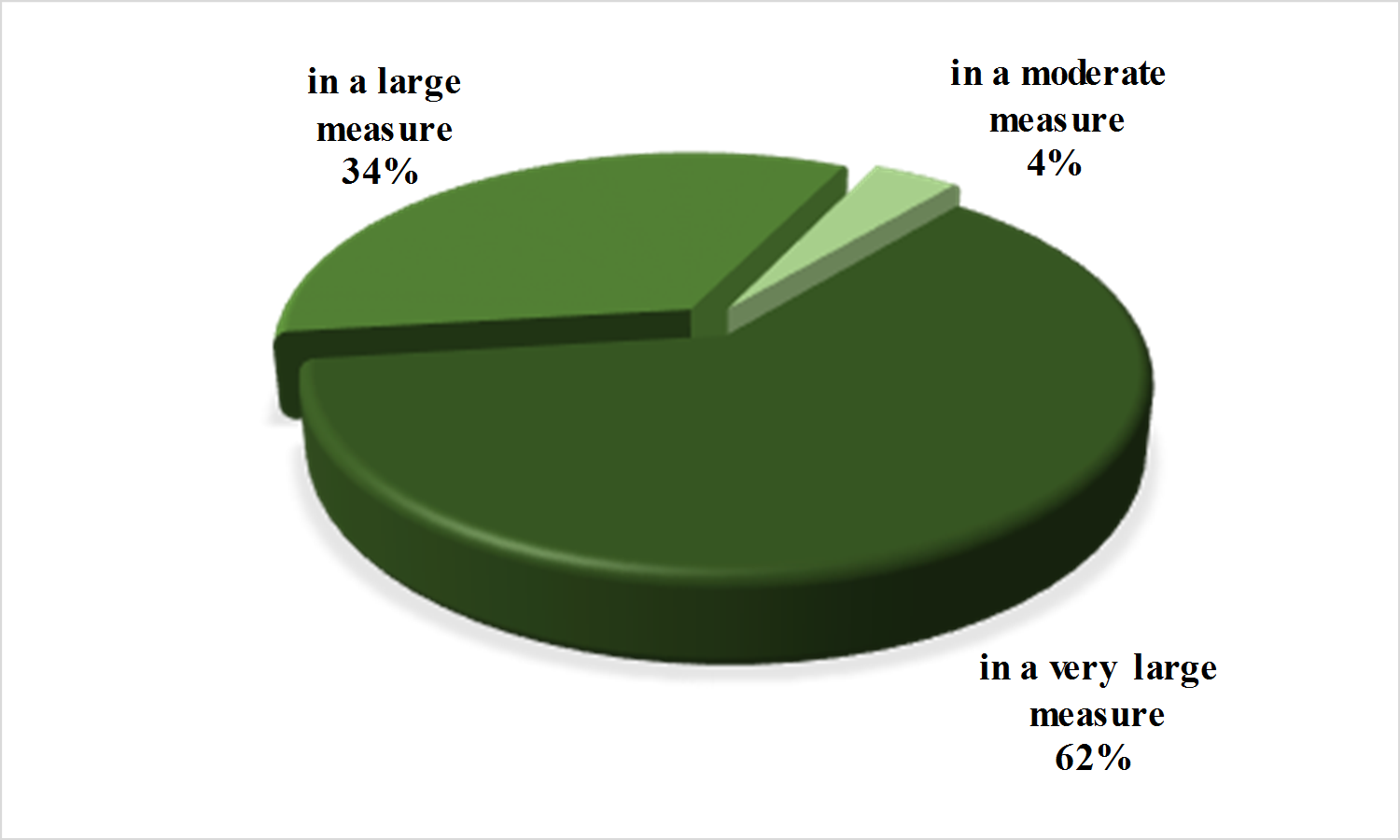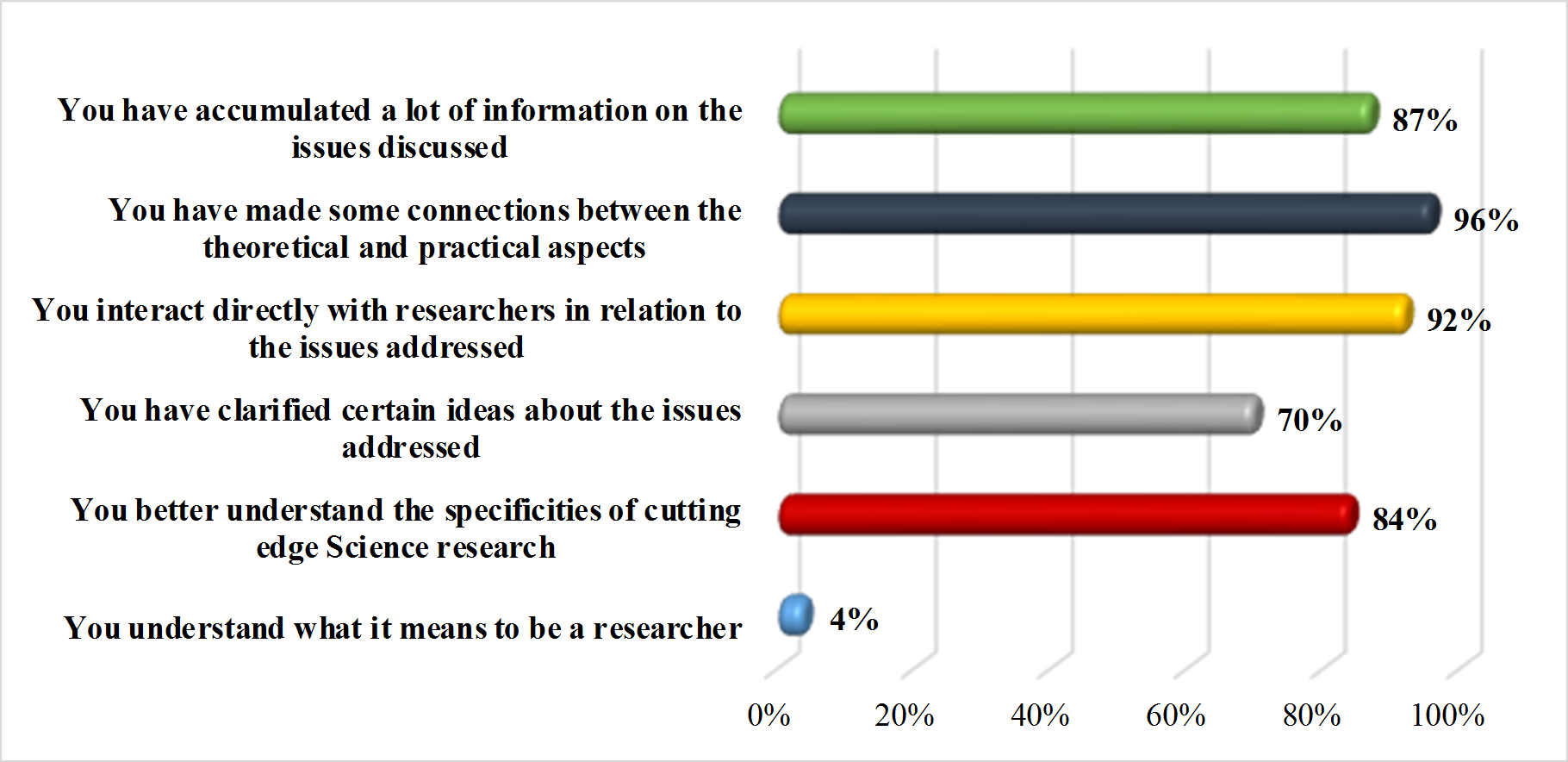Abstract
We live in a rapidly changing world in which Science and Technology advance at breakneck speed, and generally speaking, the national education (mainly characterized by conservatism), remains anchored behind the societal changes. In this respect, information related to scientific cutting-edge topics – as:
Keywords: Non-formal educationcutting edge science topicsscientific knowledgeIRRESISTIBLE project
Introduction
According to Sorin Cristea (1998), the non-formal education represents all educational activities conducted in an institutional framework, located “outside the education system, but also inside it (see the role of clubs, camps for students etc.) under the guidance of teachers specialized in designing educational activities which supports to ensure the correlation: subject - object - educator - educated levels - having a great flexibility, and complement the formal educational resources.” As such, non-formal education is carried out in institutions such: cultural centres, libraries, clubs, theatres, museums, etc. or in schools, but through extracurricular activities such as: scholar thematic meetings (on various subjects), or interdisciplinary optional or voluntary activities, school competitions, festivities etc.
Through those non-formal educational activities, it is aimed to achieve a number of objectives or countervailing complementary roles in relation to those obtained in the formal education. Among the objectives of non-formal education, the most frequently met in practice are: supporting the students’ (or even the adults’) chances to develop their own knowledge, to stimulate the development of own personality, to harness in the best ways of mixing learning and entertainment, to offer various possibilities to disadvantaged social groups to access educational settings, to educate people in the spirit of new educations etc.
Compared with the formal education conducted in educational institutions which belong to the national educational system, the non-formal environments have lower degree of organization, a more flexible structure, its objectives being set out in specific curricular documents. Usually, the non-formal education is provided by specialists in different areas, not necessarily having a certified pedagogical background, being posed in relation to the personal interests of learners and combined with external evaluation (or self-evaluation) conducted by the instructor.
George Văideanu (1988) appreciates that “the non-formal education is considered as a bridge between the knowledge assimilated during the formal lessons and the information gathered informally”, because in the contexts of training, it requires learners to have the opportunity to achieve a junction between the school and everyday life, a connection which is centered around a number of interests, hobbies, skills and individual motivations.
In recent years, there has been a global interest for diversifying non-formal education and informal contexts, while formal educational environments tend to demonstrate greater openness toward collaboration with both of them. Regarding the issues addressed in the contexts of formal education, it is one of the great offered diversity that relates directly to the beneficiaries’ interests. Thus, the contexts created by different ways of its introducing in the educational practice (projects, events, thematic applications etc.) enable interdisciplinary approaches, cross-curricular and transdisciplinary practice skills, but also life skills, in an integrated manner, developing in this sense a holistic personality (Mitulescu, & Simache, 2008).
Given that, in a globally meaning, in the recent decades, we are witnessing a real assault of discoveries in a number of cutting edge scientific areas, like: nanoscience, nanotechnology, renewable energy, smart cities etc. But the formal science curriculum has still a strong conservative format, reported both to the specific aims and to the addressed scientific knowledge. As such, the non-formal education - and even the informal attempts - assert the role of supplementing the existed knowledge, but also to try to cover the weaknesses of the formal education which must be aligned (at least, in science education) to the actual cutting edge scientific topics.
Methodology
Considering all those abovementioned premises, we try to illustrate some results of several non-formal activities conducted within the National Programme: “
• Can We Prevent Climate Change? (April 2016 - location: Valahia University Campus);
• Smart Cities and Renewable Energy (April 2016 - location: Scientific and Technological Institute of Multidisciplinary Research of Valahia University Targoviste);
•
In the end of the mentioned workshops, a questionnaire was administered to students, in order to figure their feedback related to their views / impact of the proposed activities. The questionnaire included five items of which the top three answers are supposed predefined, structured on a
The data from the questionnaire were processed by statistical mathematics methods, and were later correlated with information from discussions organized in focus groups, attended by students, teachers, university researchers and members of the
Results and Discussion
The first item targeted the students’ views on the degree of accessibility (for the general public) of the information related to cutting edge scientific issues (such: climate change, smart cities, renewable energies etc.) As reflected in figure

The next item was to identify the extent to which the surveyed students appreciated the importance of respecting and valuing the principles of ethics in the research & innovation process. Thus (figure

The third item aimed to measure the extent that students should acquire the knowledge and skills necessary for responsible participation in the research and innovation processes. Acknowledging the shortcomings science curricula, the students think that within tits aims and content, the actual curricula should introduce a number of changes designed to make more connections between science and research, on the one hand, and between the scientific knowledge and everyday life, on the other hand (figure

Related to the fourth item, the students had to choose one or more answers considering the effects of the attended non-formal activities. The results (summarized in figure

For the last item, the students expressed their personal opinion, in relation to the undertaken activities. Thus, 67% of them think that the activities were very interesting because they learned new things, and clarified a series of scientific concepts, most of them being known from TV or mass-media. In addition, the students were captivated by the addressed scientific topics which were mixed with social and ethical research issues. The remaining 33% consider that the activities were quite interesting examples that led them to understand better what they learned in school, to make connections with the everyday life, to understand how the science and technology advance, how to become a researcher.
Conclusions
Through the designed non-formal educational activities, proposed by the members of the Romanian Community of Learners set up in the IRRESISTIBLE project, whose impact is reflected directly in the students’ feed-back, it was strongly stimulated the students’ interest in science (Petrescu, Gorghiu, & Lupu, 2015).
We also believe that by multiplying those educational experiences, the students will be increasingly more interested in the development of science and technology, will realize the effects of their involvement in several aspects of their daily life: social, personal, ethical, professional, economic, demographic etc. and will act as active and responsible citizens for the future society.
Acknowledgement
This work was funded through the Seventh Framework Programme Project “IRRESISTIBLE - Including Responsible Research and Innovation in Cutting Edge Science and Inquiry-based Science Education to Improve Teacher's Ability of Bridging Learning Environments” - a coordination and support action under FP7-SCIENCE-IN-SOCIETY-2013-1, ACTIVITY 5.2.2 “Young people and science” - Topic SiS.2013.2.2.1-1: Raising youth awareness to Responsible Research and Innovation through Inquiry Based Science Education. This project has received funding from the European Union’s Seventh Framework Programme for research, technological development and demonstration, under grant agreement no 612367. The support offered by the European Commission, through the project mentioned above, is gratefully acknowledged.
References
- Cristea, S. (1998). Dicționar de termeni pedagogici. București: Editura Didactică și Pedagogică.
- Mitulescu, S., & Simache, D. (2008). Experienţe educaţionale non-formale în viaţa tinerilor. Agenţia naţională pentru sprijinirea iniţiativelor tinerilor. Retrieved at: http://nou2.ise.ro/wp-content/uploads/2012/08/Experiente-educationale-non_formale.pdf
- Petrescu, A. M. A., Gorghiu, G., Lupu, R. A. (2015). Non-formal Education - Frame for Responsible Research and Innovation Demarches. Procedia - Social and Behavioral Sciences, 180, 682-687.
- Văideanu, G. (1988). Educaţia la frontiera dintre milenii. București: Editura Politică.
Copyright information

This work is licensed under a Creative Commons Attribution-NonCommercial-NoDerivatives 4.0 International License.
About this article
Publication Date
22 December 2016
Article Doi
eBook ISBN
978-1-80296-017-4
Publisher
Future Academy
Volume
18
Print ISBN (optional)
-
Edition Number
1st Edition
Pages
1-672
Subjects
Teacher, teacher training, teaching skills, teaching techniques, special education, children with special needs
Cite this article as:
Petrescu, A. A., Gorghiu, G., & Gorghiu, L. M. (2016). The Role of Non-formal Activities on Familiarizing Students with Cutting-Edge Science Topics. In V. Chis, & I. Albulescu (Eds.), Education, Reflection, Development - ERD 2016, vol 18. European Proceedings of Social and Behavioural Sciences (pp. 458-463). Future Academy. https://doi.org/10.15405/epsbs.2016.12.56

